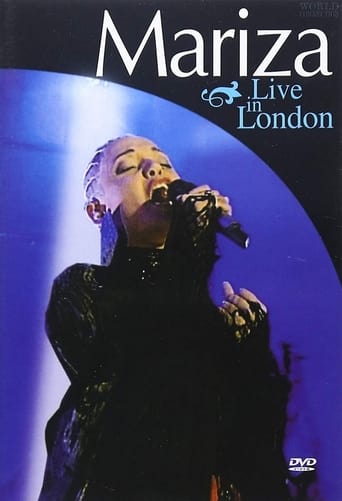Mariza: Live in London
5.5
Music
Rated:
2004
1h40m
On:
Country:
The new queen of the Portuguese folk music known as fado shines in the impressive Mariza Live in London, a 2003 concert recorded at the Union Chapel in London. The twentysomething Lisbon resident has been hailed as the successor to fado legend Amália Rodrigues; now, after two well-received CDs, comes Mariza's first filmed concert performance, and it is stunning. Mariza is backed primarily by acoustic guitar, acoustic bass guitar, and "Portuguese guitar," a 12-string instrument that looks something like a lute and sounds a bit like a Greek bouzouki; there is some piano as well, and Guy Barker's muted trumpet provides "O Deserto" with a pronounced jazzy feel. But the singer is the main attraction here, and the power and passion of Mariza's delivery on "Barco Negro" and nearly all the others in the 16-song set, including more upbeat, celebratory numbers like "Oica La o Senhor Vinho" (the introductions are in English, but the tunes are all in Portuguese) are undeniable. The new queen of the Portuguese folk music known as fado shines in the impressive Mariza Live in London, a 2003 concert recorded at the Union Chapel in London. The twentysomething Lisbon resident has been hailed as the successor to fado legend Amália Rodrigues; now, after two well-received CDs, comes Mariza's first filmed concert performance, and it is stunning. Mariza is backed primarily by acoustic guitar, acoustic bass guitar, and "Portuguese guitar," a 12-string instrument that looks something like a lute and sounds a bit like a Greek bouzouki; there is some piano as well, and Guy Barker's muted trumpet provides "O Deserto" with a pronounced jazzy feel. But the singer is the main attraction here, and the power and passion of Mariza's delivery on "Barco Negro" and nearly all the others in the 16-song set, including more upbeat, celebratory numbers like "Oica La o Senhor Vinho" (the introductions are in English, but the tunes are all in Portuguese) are undeniable. The new queen of the Portuguese folk music known as fado shines in the impressive Mariza Live in London, a 2003 concert recorded at the Union Chapel in London. The twentysomething Lisbon resident has been hailed as the successor to fado legend Amália Rodrigues; now, after two well-received CDs, comes Mariza's first filmed concert performance, and it is stunning. Mariza is backed primarily by acoustic guitar, acoustic bass guitar, and "Portuguese guitar," a 12-string instrument that looks something like a lute and sounds a bit like a Greek bouzouki; there is some piano as well, and Guy Barker's muted trumpet provides "O Deserto" with a pronounced jazzy feel. But the singer is the main attraction here, and the power and passion of Mariza's delivery on "Barco Negro" and nearly all the others in the 16-song set, including more upbeat, celebratory numbers like "Oica La o Senhor Vinho" (the introductions are in English, but the tunes are all in Portuguese) are undeniable. The new queen of the Portuguese folk music known as fado shines in the impressive Mariza Live in London, a 2003 concert recorded at the Union Chapel in London. The twentysomething Lisbon resident has been hailed as the successor to fado legend Amália Rodrigues; now, after two well-received CDs, comes Mariza's first filmed concert performance, and it is stunning. Mariza is backed primarily by acoustic guitar, acoustic bass guitar, and "Portuguese guitar," a 12-string instrument that looks something like a lute and sounds a bit like a Greek bouzouki; there is some piano as well, and Guy Barker's muted trumpet provides "O Deserto" with a pronounced jazzy feel. But the singer is the main attraction here, and the power and passion of Mariza's delivery on "Barco Negro" and nearly all the others in the 16-song set, including more upbeat, celebratory numbers like "Oica La o Senhor Vinho" (the introductions are in English, but the tunes are all in Portuguese) are undeniable.



 AD
AD